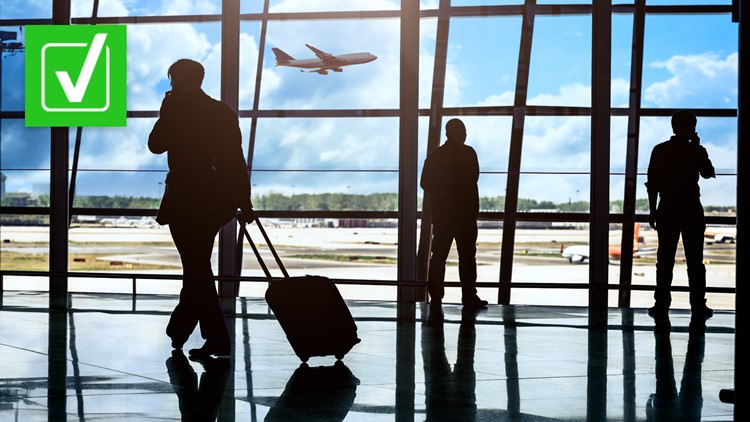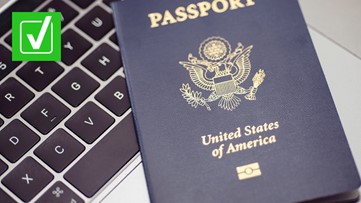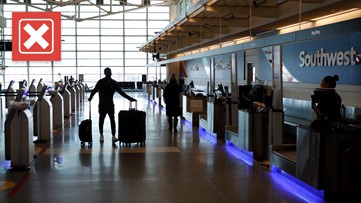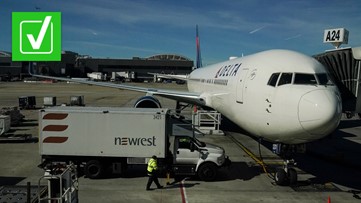Data from the Transportation Security Administration (TSA) indicates about 1.85 million travelers passed through a security checkpoint on Sunday, May 16, the most in a day so far in 2021.
As people return to flying, a May 13 blog post titled “U.S. Airlines may start weighing passengers at the gate,” has caught the attention of people on social media, and been cited by several media outlets.
THE QUESTION
Could U.S. airlines start weighing passengers?
THE SOURCES
THE ANSWER
Yes, U.S. airlines could start weighing passengers, but that’s been an option for years, according to an FAA spokeswoman and an airline representative.
WHAT WE FOUND
A post titled “U.S. Airlines May Start Weighing Passengers At The Gate” was published May 13, 2021, on the blog “View from the Wing.” The post discusses the importance of calculating the weight and balance of an aircraft. The author cites an article from AirInsight Group that shows an FAA advisory circular, published in 2019, says operators can ask passengers to participate in a weight survey, which passengers can decline to be involved in.
“Regardless of the sampling method used, an operator has the option of surveying each passenger and bag aboard the aircraft and should give a passenger the right to decline to participate in any passenger or bag weight survey,” the 2019 advisory reads. “If a passenger declines to participate, the operator should select the next passenger based on the operator’s random selection method rather than select the next passenger in a line. If a passenger declines to participate, an operator should not attempt to estimate data for inclusion in the survey.”
In an emailed statement to VERIFY, the FAA said weighing passengers at the gate is an option, but it doesn’t anticipate airlines will put it into practice.
“The FAA issued an Advisory Circular in May 2019 that stressed the importance that airline weight and balance programs accurately reflect current passenger weights,” the statement said. “Operators are evaluating their programs to comply with this guidance. While weighing customers at the gate is an option, most operators will likely rely on updated methods for estimating passenger weights.”
The option to weigh passengers is part of the FAA’s weight and balance guidance, which recommends, as a safety measure, that operators periodically estimate aircraft weight, including the weight of passengers and baggage.
In a statement, American Airlines said it will stick with other methods for estimating the weight of passengers.
“As we do today, American [Airlines] expects to continue using the Centers for Disease Control and Prevention’s (CDC) National Health and Nutrition Examination Survey (NHANES) data to determine accurate standard average passenger weights,” American Airlines said. “We’ll continue to evaluate average passenger weights for each flight we operate and adjust as needed.”
Southwest Airlines says it will also continue to use weight data from the CDC.
“All airlines submit weight and balance data to the FAA on a periodic basis,” the airline told VERIFY. “The FAA allows airlines to choose between submitting weights the individual air carrier collects or to utilize the CDC’s standard weights. Southwest utilizes the CDC’s weights.”
United and Delta Airlines deferred comment to the FAA.
A spokeswoman for the FAA and an airline representative told VERIFY that weighing passengers has been an option for years for U.S. airlines.
A previous FAA advisory circular from 2005 has nearly the exact wording as the 2019 circular.
“Regardless of the sampling method used, an operator has the option of surveying each passenger and bag aboard the aircraft and should always give a passenger the right to decline to participate in any passenger or bag weight survey,” the 2005 advisory reads. “If a passenger declines to participate, the operator should select the next passenger based on the operator’s random selection method rather than select the next passenger in a line. If a passenger declines to participate, an operator should not attempt to estimate data for inclusion in the survey.”
More from VERIFY: Yes, the airplane environment is why food isn't as good, although it's not just because of our senses
VERIFY
Our journalists work to separate fact from fiction so that you can understand what is true and false online. Please consider subscribing to our daily newsletter, text alerts and our YouTube channel. You can also follow us on Snapchat, Twitter, Instagram or Facebook.













